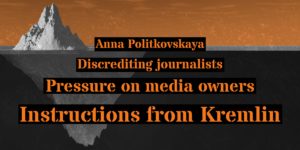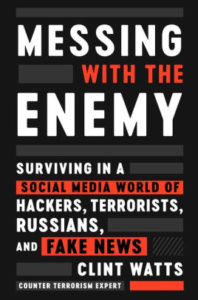Russia’s authorities are likely to use the FIFA World Cup to target journalists with their classic disinformation, notes StopFake. Based on almost three years of weekly reporting and analysis of the pro-Kremlin disinformation campaign, researchers have identified five different kinds of problematic messages, which Russian authorities and the media they control are likely to try to spread ….RTWT
The requirements of cybersecurity and democracy need not need be mutually exclusive, and the internet can enhance democratic institutions, notes analyst David M. Howard. But for democracy to survive, cybersecurity efforts must support its sustaining values, particularly free speech and informed voting. RTWT
Misinformation vs. disinformation
 The history, circulation, and management of misinformation (untruths circulated without the intention to deceive) and disinformation (untruths intended to deceive), was the focus of a half-day forum hosted by Brookings and the Social Science Research Council (SSRC).
The history, circulation, and management of misinformation (untruths circulated without the intention to deceive) and disinformation (untruths intended to deceive), was the focus of a half-day forum hosted by Brookings and the Social Science Research Council (SSRC).
Sweden is preparing for Russia to hack its election, say Carnegie analysts Tim Maurer and Erik Brattberg.
Frightful Five?
Social media firms such as Google, Facebook, Twitter and Reddit have to help defend democracy from computational propaganda, Northeastern University researcher Ronald Robertson argues in the Conversation.
What is alarming about Silicon Valley is not the abuse of power, but the power vacuum the Web has helped create, notes analyst Edward Tenner. The ‘Frightful Five’ social media giants have introduced something new, in two ways, he writes for the Hedgehog Review:
 First, their position is more asymmetric than that of older media. Their vast troves of data give them insights into public behavior that are unavailable to the public and all but a handful of cooperative researchers. ….
First, their position is more asymmetric than that of older media. Their vast troves of data give them insights into public behavior that are unavailable to the public and all but a handful of cooperative researchers. ….
- And this asymmetry compounds a second challenge to democracy: The online giants have provided autocrats and others with a set of tools that can be used to exploit our deepest ties to friends and family members in order to advance political and commercial agendas…
Countering Disinformation & Violent Extremism in the Digital Age is the focus of a New America forum, featuring Monika Bickert, vice president of global policy management at Facebook; Mi-Ai Parrish, media innovation and leadership professor, Arizona State University; and Peter Bergen, vice president of global studies at New America. 12 noon: June 6, 2018. Venue: New America, 740 15th Street NW, Suite 900, Washington, D.C. RSVP
George Washington University’s Center for Cyber and Homeland Security hosts a book discussion on “Messing With the Enemy: Surviving in a Social Media World of Hackers, Terrorists, Russians and Fake News” with author Clint Watts. 9:30 a.m. June 5, 2018. Venue: GWU, 800 21st Street NW, Marvin Center Amphitheater, Third Floor, Washington, D.C. RSVP

Credit: IISS
An upcoming event on Strategic Technologies and Their Global Implications hosted by the IISS Cyber, Space and Future Conflict Program will identify key technological advancements that are in the research and development phase and accurately forecast timetables for their effective introduction into political, military, diplomatic, and intelligence activities.
Moreover, it will assess the strategic implications of those innovations for the international balance of power between offense and defense as well as developed and underdeveloped nations. Particular attention will be paid to the question of whether these new technologies will exacerbate the ‘digital divide’ and create an even greater security disparity, or if they will have a leveling influence and enhance equality and stability among nations.
SPEAKERS
Dr. Thomas Campbell,
Founder & President, FutureGrasp, LLC;
Former National Intelligence Officer for Technology, National Intelligence Council
Katherine Charlet
Director, Technology and International Affairs Program, Carnegie Endowment for International Peace;
former Acting Deputy Assistant Secretary of Defense for Cyber Policy, US Department of Defense
Chair: Sean Kanuck
Director of Cyber, Space and Future Conflict, IISS







